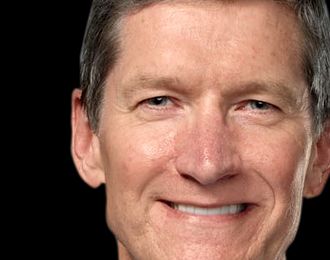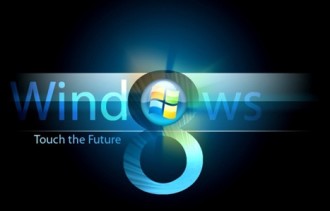Solid state drive prices to topple
Speed limits of quantum computing found
 Scientists at the University of California, Berkeley, claim to have proved a relationship between energy and time that lets people calculate the “quantum speed limit”.
Scientists at the University of California, Berkeley, claim to have proved a relationship between energy and time that lets people calculate the “quantum speed limit”.Sky to auto-block web pornography
 Broadband supplied by Sky will automatically stop customers from seeing pornography unless people actively opt out.
Broadband supplied by Sky will automatically stop customers from seeing pornography unless people actively opt out.
Blackberry recruits politicos for market share
 Blackberry is fighting back against its competitors by asking politicians to step into the apps business.
Blackberry is fighting back against its competitors by asking politicians to step into the apps business.
Dell, HP fight back on server prices
 A price war has developed on the server front after multinationals faced competition from original design manufacturers (ODMs) that make the machines.
A price war has developed on the server front after multinationals faced competition from original design manufacturers (ODMs) that make the machines.
Intelligent keyboard invented
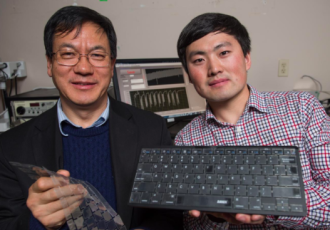 Scientists at Georgia Tech claim to have come up with an “intelligent” keyboard they believe will change the face of computing.
Scientists at Georgia Tech claim to have come up with an “intelligent” keyboard they believe will change the face of computing.
Oracle pushes out huge security update
 Database outfit Oracle has pushed out a record number of patches in a security update.
Database outfit Oracle has pushed out a record number of patches in a security update.
Included in the patch are critical fixes for Java SE and the Oracle Sun Systems Products Suite.
All up this means that the update contains nearly 170 new security vulnerability fixes, including 36 for Oracle Fusion Middleware. Twenty-eight of these may be remotely exploitable without authentication and can possibly be exploited over a network without the need for a username and password.
The worst of the bugs are in Java SE, Fujitsu M10-1, M10-4 and M10-4S. In the case of Java SE, a CVSS Base Score of 10.0 was reported for four distinct client-only vulnerabilities.
Writing in the company blog, Oracle said that out of these 19 Java vulnerabilities, 15 affect client-only installations, two affect client and server installations, and two affect JSSE installations.
The blog says that the lower number of Oracle Java SE fixes reflect the results of Oracle’s strategy for addressing security bugs affecting Java clients and improving security development practices in the Java development organization.
While that might be true, the ton of patches in the rest of the software suggests that while Java is being closely watched, other bits are not.
In the case of the Oracle Sun Systems Products Suite, CVE-2013-4784 has a CVSS rating of 10.0 and affects XCP Firmware versions prior to XCP 2232. Overall, there are 29 security fixes for the suite.
The update also includes eight new security fixes for Oracle Database Server, none of which are remotely exploitable without authentication. Oracle MySQL has nine security fixes.
There are also: 10 fixes for Oracle Enterprise Manager Grid Control; 10 for Oracle E-Business Suite; six for the Oracle Supply Chain Products Suite; seven security fixes for Oracle PeopleSoft products; 17 for Oracle Siebel CRM; one for Oracle JD Edwards Products; two for Oracle iLearning; two for Oracle Communications Applications; one for Oracle Retail Applications; one for Oracle Health Sciences Applications and 11 new security fixes for Oracle Virtualisation.
Ebay does deal with Icahn
 Online auction outfit Ebay has done a deal with its activist investor Carl Icahn that will give investors a greater say in its PayPal payments unit once it is spun off.
Online auction outfit Ebay has done a deal with its activist investor Carl Icahn that will give investors a greater say in its PayPal payments unit once it is spun off.
Ebay said it exploring a sale or public offering of its enterprise unit.
The deal clears the way for a future buy of eBay and PayPal by companies looking to gain a foothold in the e-commerce and online payments markets. Alibaba, Google and Amazon could all be interested.
Meanwhile Ebay is going to cut its workforce by seven percent, or 2,400 jobs, in the current quarter. While the company is making a pile of money, its outlook for the 2015 first quarter and full year fell short of what the cocaine nose jobs of Wall Street expected, so its workers will have to pay the price.
The planned job cuts will be across the board in all parts of the company except the board. Payments and enterprise divisions will be hit, eBay said. Restructuring and separation costs are expected to be between $210 million and $240 million in the first quarter and $350 million to $400 million for the entire year.
Also under the deal with Ichan, Icahn Capital executive Jonathan Christodoro was named to eBay’s board. He will have the ability to transition to PayPal’s board once the spin-off occurs.
Two Wall Street bankers has been added to its board, because you always need a board full of bankers.
PayPal agreed to adopt a number of measures proposed by Icahn, which the billionaire said enhance corporate governance at the fast-growing payments arm. The provisions are intended to give shareholders a larger voice in important decisions, particularly an acquisition bid.
They include a provision that any “poison pill” designed to ward off acquisition attempts be ratified by stockholders or expire after 135 days, and that holders of 20 percent of its shares be allowed to call a special meeting of stakeholders.
EBay plans to split its marketplace division from PayPal in the second half of this year. PayPal will be a standalone publicly traded company, which some analysts say will be worth $40 billion.
Many companies will miss Windows server deadline
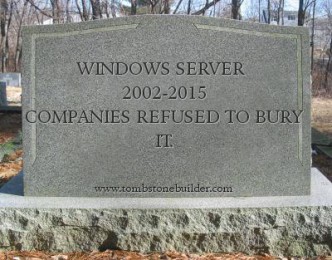 Companies are doomed to miss the end of the life of Windows Windows Server 2003, warned software experts.
Companies are doomed to miss the end of the life of Windows Windows Server 2003, warned software experts.
The server operating system will retire in six months and many companies will still have boxes running the OS when Microsoft finally kills it off.
David Mayer, the director of Microsoft Solutions for Insight said that companies had adopted an approach that “it is not broken so they did not need to fix it. It was the first really mainstream server from Microsoft, a really solid OS, and gave Microsoft a lot of credibility in server software.”
Microsoft will end security updates for Server 2003 on July 14 which should end the product’s support lifecycle. It has been supported years longer than the usual decade.
But there are still millions of machines running Server 2003, with pockets of the software in most data centres and it is a significant effort to upgrade. While getting rid of a dead XP laptop is not a problem, server replacement is tricky.
A server might contain unsupported software and the company that built them may be out of business or the in-house development team may have been disbanded. Updating this software might be impossible.
Many of those applications are 32 bit and while Windows Server 2012 R2 offers a compatibility mode to run such applications it does not always work.
Microsoft is likely to make a killing out of after-retirement support contracts, or “Custom Support,” to its largest customers. Under a Custom Support agreement, Microsoft provides patches only for the security vulnerabilities it has rated “critical,” its highest threat ranking.
This time Redmond is suggesting that its customers facing end of support to shift their servers to the cloud. However, that might be an additional change too far for many companies.
LG denies it has a fire breathing Snapdragon
 While Samsung has pulled Qualcomm’s Snapdragon 810 from its new Galaxy S smartphone, because of overheating problems, another customer is denying there is anything wrong with it.
While Samsung has pulled Qualcomm’s Snapdragon 810 from its new Galaxy S smartphone, because of overheating problems, another customer is denying there is anything wrong with it.
LG said it has encountered no overheating problems with Qualcomm Snapdragon processor and it will be powering a curved screen G Flex2 smartphone later this month.
Woo Ram-chan, LG vice president for mobile product planning, said that he was aware of the various concerns in the market about the (Snapdragon) 810, but the chip’s performance is quite satisfactory.
The comment came after Bloomberg reported a day earlier that Samsung Electronics, the world’s top smartphone maker, decided not to use the new Qualcomm processor for the next flagship Galaxy S smartphone after the chip overheated during testing. To be fair, Samsung and Qualcomm have declined to comment on the record about the reason for Samsung abandoning the chip. Sources which cite overheating are so far unnamed.
Samsung is widely expected to unveil the new Galaxy S smartphone in early March, and Bloomberg reported that the Korean firm will use its own processors instead.
Woo said on Thursday that internal tests for the G Flex2, powered by the new Qualcomm processor, show that the new product emits less heat than other existing devices. The new phone is scheduled to start selling in South Korea on January 30.
He said he didn’t understand why there is a heat problem with the Galaxy S that his phone does not have.
Windows 10 will be free
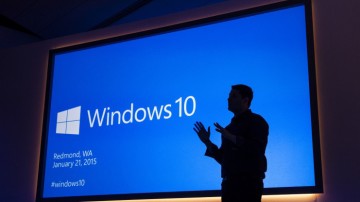 Microsoft has released details of Windows 10 and said that it will be free for many current Windows users.
Microsoft has released details of Windows 10 and said that it will be free for many current Windows users.
The company unveiled the Windows 10 consumer preview yesterday and showed off many new features which will be available.
What is surprising is that Windows 10 will be free for existing Windows users running versions of the OS, going back to Windows 7. That includes Windows 7, 8, 8.1 and Windows Phone.
Microsoft said that the upgrade would be free for the first year of release, but people would need to pay for it after that. However, Microsoft will support the upgrade for the “lifetime of the device”.
Microsoft CEO Satya Nadella said at the event he wanted Windows 10 to be the most loved release of Windows. It will have services everywhere but no bolted on apps.
There will be a new web browser for Windows 10, codenamed Project Spartan. It’ll be the primary browser in Windows 10 and will be available on PCs, tablets and phonesallows users to “draw” directly on a web page for quick sharing of notes. It includes a fully integrated reading list that follows a user across devices, as well as a built-in PDF viewer.
Another unusual thing about the OS is the use of a sort of virtual reality, called Windows Holographic, powered by a new kind of device called the HoloLens.
Microsoft’s Corporate Vice President of the Operating Systems Group, Joe Belfiore, announced it would bring back the much-missed Start Menu, but Belfiore revealed it would also have a full-screen mode that includes more of the Windows 8 Start screen. He also said Windows machines would go back and forth between two menus in a way that would not confuse people. Right.
Belfiore also showed a new notification centre for Windows, which puts a person’s notifications in an Action Center menu that can appear along the right side, similar to how notifications work in Apple OS X.
There is also a thing called Continuum to help so-called hybrid devices flip between themselves. Removing a keyboard from a tablet like the Surface Pro 3, say, will call up a dialogue box asking if a human wants to switch to tablet mode.
Microsoft has also parked its Cortana into Windows 10. People will be able to access it using a search bar next to the Windows logo in the taskbar.
Describing Cortana showed how users could ask it to play music, answer queries launch apps and open specific files, like a PowerPoint deck you’ve been working on. Cortana is also built into Spartan.
Windows 10 can work on devices smaller than 8 inches, which would have a special version of the OS tuned to the precise touch capabilities needed.
As an example of Universal Windows Apps, which are apps that provide a multi-modal experience across devices, Belfiore showed off revamped mobile versions of Microsoft Office.
The “consumer preview” version of Windows 10 will be available for PCs starting next week, and for phones in February. Some of the Windows 10 features Microsoft showed at the event will not immediately be available in preview builds of the software, but will roll out in the next three to four months.
Microsoft hasn’t yet set a date for the general release of Windows 10, but it’s expected to launch in the Autumn. Or Fall. Pride comes before a fall.
Oracle unveils X5 with Intel Inside
 Oracle chairman and chief technology officer Larry Ellison unveiled X5, its fifth generation of Oracle’s engineered systems, to media and analysts at company headquarters on Wednesday afternoon.
Oracle chairman and chief technology officer Larry Ellison unveiled X5, its fifth generation of Oracle’s engineered systems, to media and analysts at company headquarters on Wednesday afternoon.
Ellison introduced the company’s X5 as “the future of the datacentre” based on Intel Xeon® E5-2600 v3 processor family (Haswell-EP with up to 32 cores) and support for high bandwidth NVM Express (NVMe) flash drives.
The X5-2, a 1U two socket server, is designed and optimised for running Oracle Database in a clustered configuration. Optional four NVMe drives can be used to accelerate Database performace via Smart Flash Cache. This server is targeted at high-density vitualization environments.
The X5-2L, a 2U platform, is targeted for single-node databases and enterprise storage applications. The supports up to 758GB of memory, and configured for a maximum of 50.4TB of direct attached storage.
Also announced was Oracle’s NVM Express (NVMe) design providing up to 6.4TB of hot-swappable flash providing 2.5X the data rate of older SAS3 SSD interface drives using PCIe Gen3 Small Form Factor NVM SSD drives (12Gb/s vs. 32Gb/s). NVM Express flash technology is optimized to accelerate Oracle Database using a feature called Database Smart Flash Cache. This feature keeps recently accessed data warm in flash storage, reducing the chance that the database needs to fetch the data from slower magnetic media that may be direct attached or resident on a NAS/SAN fabric. In addition to the high-bandwidth interface to the NVM Express SSDs, the flash technology itself has been engineered to be high-endurance and write-optimized for Oracle Database.
Ellison’s new “vision” entails connecting datacentres efficiently and at lowest cost to the cloud – “There has to be some degree of compatibility between the public cloud and your private datacentre”, Ellison said.
Ellison emphasised Oracle’s “new strategy” using Intel processors to compete for the two-socket core business. The new “Virtual Compute Appliance X5” converged infrastructure system, consists of compute servers and software defined networking.
That integration comes in the form of th Virtual Compute Appliance X5 converged infrastructure system, consisting of compute servers, software-defined networking and Oracle designed hardware. Ellison went on to highlight the company’s abilities in software defined configuration of server and storage networks on VCA, supporting infiniband internal networking with external connectivity provided by Ethernet and Fibre Channel to link with existing networks.
Included within the X5 product portfolio are Oracle’s Big Data Appliance for Hadoop and NoSQL big data jobs and Exalogic X5-2 for private clouds.
Ellison described Oracles Zero Data Loss Recovery Appliance capable of full data recovery with real-time “redo” transport and fully automated recovery functions, log re-examination with extraction of malicious transactions followed by re-entry of those processes again allows the appliance to be restored to any point in time.
Further the appliance, which can handle thousands of databases with backup connections to on-site datacentre, remote datacenters and cloud. “The big deal is it’s fully automated, so it’s easy to operate, and you never lose data. It’s a no brainer appliance as we have, “Ellison stated.
Ellison reminded the audience that “Oracle manufactures tests and supports all of these products in-house”, naming rivals Cisco, EMC, VMware, Microsoft and Red Hat hinting at more expensive and fragmented support by rivals. Further “One appliance alone can handle thousands of databases with potential backup connections to on-site datacentres, remote datacentres, and the cloud.” he said.
“The big deal is it’s fully automated, so it’s easy to operate, and you never lose data. It’s as a no-brainer appliance as we have,” Ellison remarked.
He further stressed Oracle has manufactured, tested, and support all these pieces in-house, calling out rivals Cisco, EMC, VMware, Microsoft, and Red Hat and hinting at more fragmented (not to mention expensive) deployment options. All X5 machines are available now.
TechEye Take
The rumor of the Intel invasion of Oracle has been circulating since OracleWorld 2012. This is a major shift for Oracle. The company’s management, currently in the midst of a “reinvention period”, includes the fact that Larry Ellison is executing a gradual accession plan as he moves toward retirement.
The X5 release is seen as one aspect of the company’s new strategy – one in which the company protects their private datacentre market base while adjusting to a world increasingly enveloped by the evolution of open hardware, software and the cloud. Ellison is a sharp toothed shark and Oracle is having a problem finding a way to replace his natural instincts – how this evolves is another one of those “only in the valley” stories.
It is looking like a very good year for Intel’s E5000 series though…,
Government in school technology push
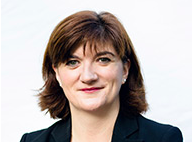 The coalition government has used a teachers’ conference in London to encourage primary schools to up their technology ante.
The coalition government has used a teachers’ conference in London to encourage primary schools to up their technology ante.
Microsoft must recover from Windows 8 debacle
